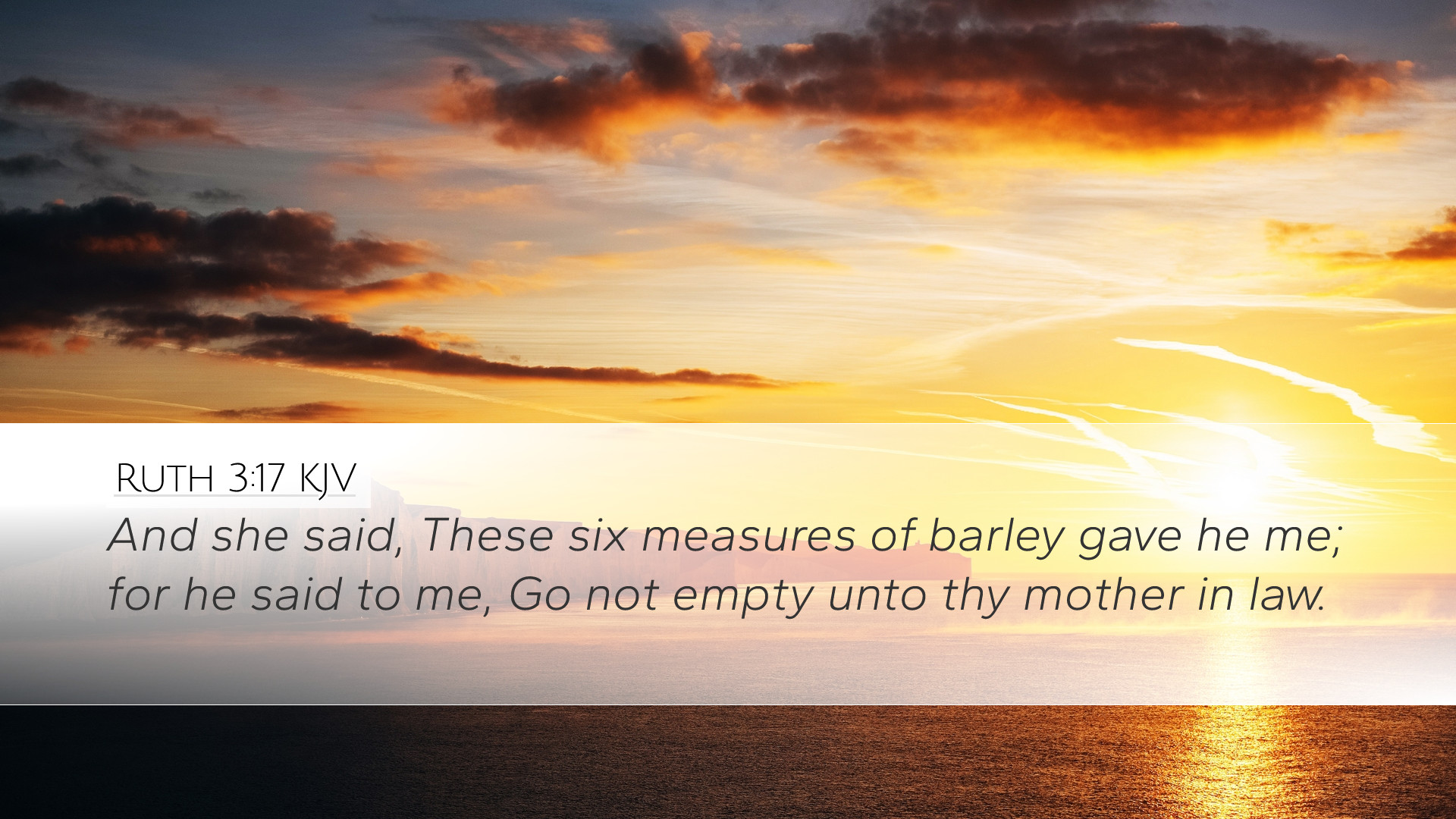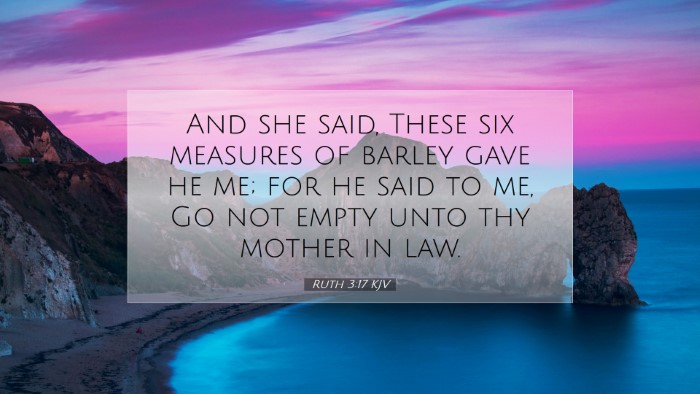Old Testament
Genesis Exodus Leviticus Numbers Deuteronomy Joshua Judges Ruth 1 Samuel 2 Samuel 1 Kings 2 Kings 1 Chronicles 2 Chronicles Ezra Nehemiah Esther Job Psalms Proverbs Ecclesiastes Song of Solomon Isaiah Jeremiah Lamentations Ezekiel Daniel Hosea Joel Amos Obadiah Jonah Micah Nahum Habakkuk Zephaniah Haggai Zechariah MalachiRuth 3:17
Ruth 3:17 KJV
And she said, These six measures of barley gave he me; for he said to me, Go not empty unto thy mother in law.
Ruth 3:17 Bible Commentary
Commentary on Ruth 3:17
Bible Verse:
Ruth 3:17 - “And she said, These six measures of barley gave he me; for he said to me, Go not empty unto thy mother-in-law.”
Contextual Overview
The Book of Ruth is a beautiful narrative that unfolds during the time of the judges, presenting themes of loyalty, providence, and redemption. In Chapter 3, we witness Ruth's bold initiative to seek security through Boaz, her kinsman-redeemer. This verse captures her return to Naomi after her encounter with Boaz, carrying tangible evidence of his favor.
Insight from Public Domain Commentaries
Matthew Henry's Commentary
Matthew Henry emphasizes the significance of the barley Ruth brings back to Naomi. He notes that this generous gift symbolizes both Boaz's kindness and his intention to provide for Ruth and Naomi. Henry points out that Boaz's command to Ruth not to return empty-handed to her mother-in-law reflects a deep sense of obligation and care—an echo of the Biblical principle that the poor and needy should be remembered and cared for. This act illustrates God’s provision for His people even in challenging times.
Albert Barnes' Commentary
Albert Barnes draws attention to the cultural context of Ruth's action. He explains that bringing home grain was a sign of blessing and a tangible token of Boaz’s respect and willingness to fulfill his duty as a redeemer. Barnes further elaborates on Naomi's reaction and the implications of Ruth receiving these measures of barley. It signifies hope and assurance of future provision, reinforcing the covenantal blessings that the people of Israel were to experience. Barnes also notes that the six measures might symbolize completeness and generosity, suggesting ample provision for the future.
Adam Clarke's Commentary
Adam Clarke provides a detailed analysis of the measures of barley. He states that six measures likely denote a significant quantity, reinforcing that Boaz fully intends to aid Ruth and Naomi. Clarke points out that Boaz’s command to not let Ruth go empty-handed reflects the Biblical principle of honoring family and community ties, a recurring theme throughout the text. He highlights how this gift serves a double purpose: it reassures Naomi of God's care and provision, and it sets the stage for the unfolding redemptive story that will give rise to the lineage of David and ultimately Christ.
Theological Implications
This verse encapsulates several key theological themes that are vital for pastors, theologians, and scholars:
- Divine Providence: The act of Boaz giving Ruth barley speaks to God's provision in the lives of His people. It reminds us that God often uses others to fulfill His promises of care and sustenance.
- Family Loyalty and Responsibility: Ruth's loyalty to Naomi is a central theme. This verse shows an intimate picture of familial responsibility and the care that should be exhibited among family members.
- Expectation and Hope: Naomi’s encouragement of Ruth to seek Boaz’s help shows an underlying expectation for a hopeful future. The barley serves as a physical manifestation of hope and promise, not just for physical sustenance but also for continued lineage and blessing.
- Christological Foreshadowing: Boaz as a kinsman-redeemer foreshadows Christ's work as the ultimate redeemer of humanity, demonstrating God's plan for redemption that weaves through the entire narrative of Scripture.
Conclusion
Ruth 3:17 serves as a pivotal moment in the narrative, rich with meaning and implications. The gifts and acts exchanged between Boaz and Ruth highlight the overarching theme of providence, loyalty, and redemption that threads through the Book of Ruth and extends into the broader Biblical narrative. As we reflect on this passage, we are reminded of God's faithfulness to provide for our needs and the importance of our relationships within the community of faith. This verse encourages us in our own walks with God, reminding us that He does not leave us empty but continually pours out His blessings upon us.


